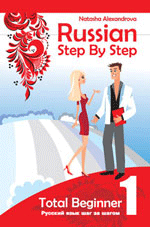Everbrite's Russia, Belarus and Ukraine PagesBelarus Russia Russian Consulate Information: Obtaining a Russian Visa Tidbits for Tourists: Russia Regional Information: Central Moscow Tour- in four parts with map: Travel in Russia planes, trains and automobiles Trans-Siberian Trains Russian Language Ukraine |
Russian LanguageBooks, Tapes and Other Resources Page Contents NOTE: All the links for books mentioned on this page are to the Amazon site in the United States. 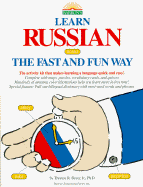
Very Basic Materials: There are several books that teach the basics of Russian Language for beginners that don't take too much time and energy and will at least familiarize one with the rudiments of the language. None of these are perfect and a combination of several is probably best. More for Self Study: If you really want to learn the language, not just enough to use when traveling, or you suddenly feel the need to brush up on forgotten skills, then there are a number of books that can serve this purpose quite well. One of the most highly recommended book/audio combinations is Nick Ukiah's Take Off in Russian: More Audio Than Any Comparable Course: The Easiest Way to Learn Russian. This combination of workbook and either cassettes or CDs consistently gets tops marks from reviewers. The audio portion offers almost five hours of listening materials. The fourteen units all contain: dialogues and activities, pronunciation practice, detailed grammatical help, cultural information and reading practice, test and revision sections, language learning techniques.
Russian Conversation and Phrase Books 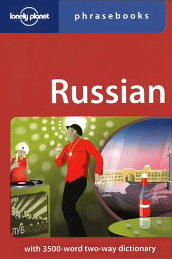
Many travelers will find that this type of book will be all they need in addition to learning the letters of the Cyrillic alphabet. The Lonely Planet Russian Phrasebook: With Two-Way Dictionary gets top marks from reviewers. The current edition was last updated in 2009. This bidirectional dictionary and phrase book features real conversations with colloquial expressions including a section on 'bad' language and another about dating. There is a very clear pronunciation guide with phonetic transcriptions to help communication and location maps to illustrate exactly which areas are covered. The additional tidbits and tips about life and customs are also useful. Its pocket size is considered an advantage by many, but the small size of the print does receive occasional complaints. 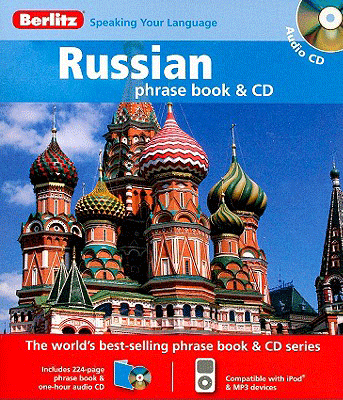
Berlitz Russian Phrase Book by Berlitz who probably sell more phrase books and language materials than other companies. This particular book was recently redesigned in 2008 and now includes a CD. The book contains practical up-to-date words and phrases, useful travel tips, an easy-to-read pronunciation guide, and color coded organization of topics for easy reference. Each section includes essentials at the beginning with the basic vocabulary for that unit. Individual topics include basic expressions and accommodations, eating out, travel, sightseeing, stores and services, health, a bilingual dictionary, and a reference section. Its downfall in my opinion is that it is not really pocket-sized as the book is about the same size as the CD. 
Essential Russian Phrase Book by Periplus Phrase Books was first published in 2000. It contains the essential information needed by first-time and experienced travelers alike, presented in a way that's concise, accessible, and easy to understand. This guide features over 4,000 words and phrases and is divided into 15 sections, covering all subjects that people are likely to encounter in their travels, from reserving a room for the night or ordering dinner at a restaurant to what to do when the rental car breaks down or how to change a flight. There is also a detailed phonetic pronunciation table, plus an extensive word list and grammar guide that will enable travelers to construct basic sentences. While it might get good reviews, its size is awkward as its dimensions are not nearly as small as the Berlitz or Lonely Planet books. Russian Language Map by the same folks who designed "Russian in 10 minutes a day" is an excellent, lightweight alternative for folks for aren't looking for something extensive. The laminated, fold-up, map-like format is convenient, durable, and a easy to use. It includes hundreds of essential words and phrases divided into easy categories like "Meeting People," "Dining Out," and "Transportation." Words and Phrases are in English, in Russian and in transliterated English.
Traveling to several different countries where you don't speak the language? Worried about having to carry several different dictionaries or phrasebooks?
You might be interested in these alternatives which are picture books that you can point to instead of trying to play charades or draw pictures. Try the following (listed alphabetically): Russian English Russian Dictionaries Desk use dictionaries: There are tons of these and often each has its own advantages and disadvantages. Personally I use Kenneth Katzner's English-Russian, Russian-English Dictionary. I really like the American English spellings and idioms but must admit that the binding isn't very good. Even though I covered mine in paper and used cardboard for support, it started to break in two. Now I have an English-Russian volume and a separately bound Russian-English volume.As an American English speaker, I find this more useful than the equally popular and well thought of Mass Market Paperback Oxford Russian Dictionary: Russian-English English-Russian by Della Thompson. Note that this is not the same book as the Hardcover Oxford Russian Dictionary: Russian-English English-Russian edited by Marcus Wheeler and others, which gets less praise from reviewers. One other dictionary that should be considered is the Penguin Russian Dictionary compiled by W. F. Ryan. Its more than 140,000 entries and derivatives cover the whole range of the written and spoken language, including literary words, slang, and technical terminology. Pocket Dictionaries:
This type of dictionary is better for students of the language or those who already have some knowledge of the language. Most travelers would probably be much happier with the conversation and phrase books mentioned above. Personally, I use an older version of the Collins Gem Russian Dictionary. I haven't seen the new one, but the plastic binding of mine has held up nicely and it's very compact. The latest version was released in 2003 (mine is from 1993) and its dimensions are bigger, more on the order of a postcard, not palm-sized. Today there are numerous online translators. One of the easiest is provided by Google at translate.google.com. Another is offered using the Chrome browser. Yahoo offers their own translation at bablefish.yahoo.com. Both let you translate entire web pages, which is often useful for travelers. It should be noted that none of these are perfect. In fact, without some knowledge of the other language, these are pretty much worthless some of the time. I suggest looking at more than one to get a better idea of the translation of large portions of text or websites. As an alternative or supplement, I especially like Promt's OnLine Translator. |
last revised 18 September 2011 © 2003-2011 Ruth E. Imershein
The information contained on these pages is intended to assist in making travel plans but things change, mistakes can be made.
Please do not depend entirely on this information when making your decisions.
![]()
Made with a Mac
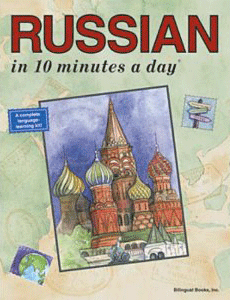 Another basic book that teaches Russian for beginners is Kristine Kershul et al.'s
Another basic book that teaches Russian for beginners is Kristine Kershul et al.'s 